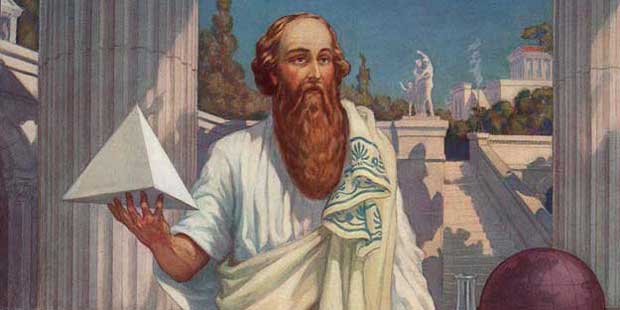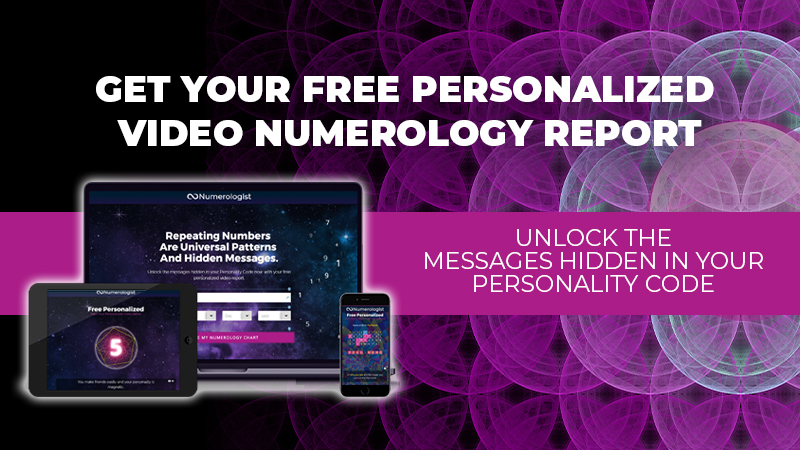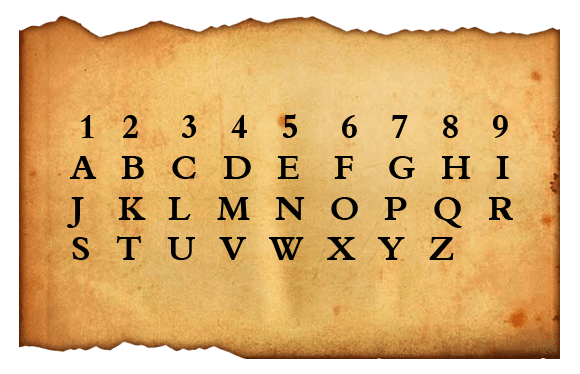The Pythagorean Numerology System
Pythagoras of Samos is a well-known ancient Ionian Greek philosopher and mathematician who developed a theory of numbers and founded the very first university, around 600BCE. We can thank Pythagoras for discovering the Pythagorean numerology system as we know it today which includes base-10 numerals and the Latin alphabet.

Pythagoras was a philosopher who came up with the idea of numbers as symbols instead of just being numerals. He theorized that everything had a predictable cycle and that there was a relationship between numbers and the alphabet. It was that idea which was then carried forward into modern numerology.
>> Click here to get your free personalized video numerology report <<

Western numerology takes the underlying principles of Gematria and applies them to our modern Latin alphabet, taking the ideas used for the Hebrew alphabet and modifying them, so that words (and names) can have numbers today as well.
Calculate All Numerology Numbers
To add this Numerology calculator to your web site
Click on the Copy Text button to copy the code below and paste it into your website
To apply Pythagorean numerology to modern words and writing, we need to convert the modern alphabet using a Pythagorean conversion table. This assigns a number to each letter of the alphabet, like so:

Pythagoras believed that each planet has its own sound and that the sound could be represented using numbers. He found that numbers had male or female qualities, and had their own natures (ugly or beautiful, introvert or extrovert). Pythagoras said that some numbers carry karma with them, so the actions of a past life are moved into the present through numbers. He used 1 to 9 as normal numbers and called 11 and 22 the master numbers, which represent the force of karma.
Each number has positive and negative qualities.
Number 1
Courageous, a leader, individual, and willing to take the initiative.
Selfish, lazy, egotistical and aggressive.
Number 2
Loving, a partner, diplomatic and co-operative.
Tends to vacillate, timid, overly sensitive, and tactless.
Number 3
Artistic and creative, expressive, imaginative, cheerful and sociable.
Loose talk, exaggeration, and pessimistic.
Number 4
Practical, industrious, constructive.
Poor imagination, overly serious, argumentative.
Number 5
Free-spirited, sexual, versatile, amusing and knowledgable.
Careless, restless, nervous and changeable.
Number 6
Artistic, responsible, a family maker, care selflessly for others.
Sensitive, skeptical, and struggles to be alone.
Number 7
Spiritual, wise, analytical.
Selfish, egotistical, aggressive and lazy.
Number 8
Organized, good judgment, systematic.
Impatient desires too much recognition, materialistic.
Number 9
Philanthropic, humanitarian, selfless.
Moody and impulsive.
Number 11
Intuitive, inspirational, spiritual.
Nervous, impractical, a loner.
Number 22
Practical and a spiritual master.
Conflict between those inner feelings and practical nature.
A person’s date of birth and their name can be used to learn a lot about their future.
Personal Years and Numerology
One concept that is important in the world of numerology is the personal year. The personal year can be used to help you get an idea of what may be coming in the coming year, based on when you were born.
To determine your personal year add the day and month that you were born, to the number of the current year.
Note that double digits are added together. Let’s take the example of someone who was born on the 3rd of November who wants to know what 2019 will be like.
3 + 11 + 2019
Add the double digits together:
3 + 2 + 12
Becomes
3 + 2 + 3 = 8
So for that person, 2019 is their Personal Year 8.
Each personal year has a focus:
Year 1
The year of new beginnings, growth, learning, and options.
Year 2
The year for building partnerships, relationships, and the home.
Year 3
The year to focus on moving forward with your own goals and ambitions.
Year 4
The year for prioritizing practicality, self-discipline, and work.
Year 5
A year of change and a chance to take a new direction.
Year 6
The year of focusing on new personal relationships; healing damaged ones and finding new harmony.
Year 7
A year for self-reflection and realization, and a chance to find yourself.
Year 8
A year to focus on material accomplishments, money and freedom, and a time to be practical.
Year 9
A time to let go of the things that are not working for you.
The Destiny Number and Pythagorean Numerology
The Destiny Number is a number that shows the environment and the opportunities that a person is born into. It is thought of as a goal that should be reached. The Destiny Number is calculated by finding the sum of all of the numbers in the full name of the individual (first name, last name and any middle names). It can be calculated using the name assigned at birth, or the name that the person opts to go by later in life. It can be interesting to see how those numbers differ, and whether they diverge or follow on from each other, as well as whether a person fulfills their given name destiny around the time that they adopt a new name.
In addition to the Destiny Number, there is also a Life Path Number. This number represents a person’s inner talents and abilities, and the lessons that they must learn. It is calculated as the sum of a person’s birth date (the day, month and year).
There are many other important numbers. The Soul Urge Number is calculated using the values of the vowels in a person’s name, and it reveals what a person’s Heart’s Desire is. The personality number is calculated using the consonants in a name, and it shows what a person presents to the outside world.
The ‘Ultimate’ number is the number which shows the wish or desire that will surface as a person enters middle age. It is the sum of the destiny number and the talent number. This number can indicate a person’s awareness and maturity.
The Challenge Number
Finally, the Challenge number represents the weaknesses or challenges that a person will face throughout their life. When calculating the challenge number, any master numbers (22 or 11) should be summed into single digits. The challenge number is unusual because finding it involves more than just addition.
Take the date of birth of the person, and find the difference between the month and the day. Let’s take someone born on the 3rd of November, 1981. For them, that would be 2 – 3, or -1, which is resolved as 1.
In this case, eight is the first challenge number.
The second challenge number is found by finding the difference between the day and the year. In this case, that is 3 – 0 = 3.
The third challenge number is calculated by finding the difference between the first and the second. So, 2 – 3 = -1.
The fourth challenge number is the difference between the month and the year. Or, in this case 2 – 0 = 2.
Once we have those four challenges, 1, 3, 1, 2. We can divide the person’s life into four parts. As you can see, the number 1 appears twice, which puts a lot of emphasis on it. This person wants to be a leader and express their individuality but may struggle with ego or motivation, and that is something that they will see repeated throughout their life.
Numerology Is Fluid
Numerology is fluid and represents what a person thinks, feels and wants. When a person goes through a life event that changes their name, this can change their numbers. A person can fight against what the numbers show for them as well. Just because the negatives read one thing, it does not mean that a person has to succumb to those challenges. Numerology is a good guide for what a person should look out for so that they can become the best version of themselves.
Some people are indeed born artists, thinkers, tycoons or leaders. That does not mean that they are unable to hone other aspects of their personality and build other positive traits. Knowing that you have particular strengths is useful, though. A natural communicator could use those strengths to build up a following and then hone their planning skills on top of that.
If you are someone who has a foreign name and who chose a western name when you were older, it can be interesting to look at both names. Does the name that you were given differ from the name that you selected? The name that you chose when you were older could provide some interesting insights into what you would like to be and how you want others to see you. If your given name is written in a different alphabet, try a transliteration of it to see what it shows for you.
Other Types of Numerology
The Pythagorean form of numerology is not the only type that exists. Another ancient form of numerology is the Chaldean system. This system uses the numbers one to eight, with nine being ignored except for specific situations. Another difference between Chaldean numerology and Pythagorean Numerology is that the Chaldean system makes more use of a person’s shorter, day-to-day name, rather than the full name that a person was given at birth.
The systems can differ rather significantly in the readings that they give, but just as there are numerous types of astrology, palmistry or other reading systems, no one reading is better than the other. It is worth a practitioner experimenting and then seeing which method suits them the best. Pythagorean numerology is widely practiced today and is still evolving, while the Chaldean way was popular in the Babylonian times and is now almost frozen in time. The Chaldean system has some strong mystical undertones, and it is something that is favored by those who have leanings towards those ‘dead’ and almost forgotten religions.
Finding a competent practitioner of Chaldean numerology today can be difficult, but the literature is out there for those who want to learn it. Pythagorean numerology, on the other hand, is popular enough that you will find it in many parts of the world. There is a thriving community of people who subscribe to the practice, and there are numerous websites devoted to it.
Numerology and Religion
One thing that many people struggle with is reconciling their interest in numerology with their religious beliefs. Interestingly, numerology is something that appeared in the bible. Some people take the stance that when numbers are referenced in the Scripture there is a hidden meaning behind the choice of number. Others prefer to be more literal in their interpretation and assume that the number was simply a reference to the number of items or people that were present at the time.
Even with that interpretation, there are some important numbers. Jesus went out into the Wilderness for 40 days, while the Israelites were wandering the desert for 40 years. The number of the beast is 666. The number three represents the Trinity, and there are numerous references to trinities in the bible and Catholicism. Not just the Father, Son, and Holy Ghost but also omniscience, omnipotence, and omnipresence. There are four cardinal directions and four gospels. Six is the number of ‘human imperfection’, while seven is the number of spiritual perfection.
Numbers mattered in the Bible, and numbers matter to those who follow numerology. Where numerology is taken as guidance rather than as law, it becomes easier to reconcile its use even for those who support an existing religion. Numbers offer insight; they do not tell us what we are divinely set out to do. They do not dictate our future, but they can give us some insight into why we feel the way we do and have our individual motivations.

Gain more knowledge about Numerology from our helpful resources page. If you want to learn more about what your name and birth date say about you get a free personalized numerology report.
